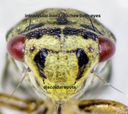Oncopsis
Oncopsis
Classification
- Phylum: Arthropoda
- Subphylum: Hexapoda
- Class: Insecta
- Order: Hemiptera
- Suborder: Auchenorrhyncha
- Infraorder: Cicadomorpha
- Superfamily: Membracoidea
- Family: Cicadellidae
- Subfamily: Eurymelinae
- Tribe: Macropsini
- Genus: Oncopsis
Pronunciation
How to pronounce Oncopsis: /ɒŋˈkɒpsɪs/
These audio files are automatically generated. While they are not always 100% accurate, they are a good starting point.
Images






Summary
Oncopsis is a genus of leafhoppers characterized by their unique pronotal striations and belonging to the family Cicadellidae, with a presence of at least 23 species in the region.
Physical Characteristics
Leafhoppers in the genus Oncopsis possess parallel striations on the pronotum that align with the hind margin, distinguishing them from other related taxa.
Identification Tips
Look for the distinct parallel striations on the pronotum that run parallel to the hind margin, as this is a key identification feature for the genus.
Habitat
Oncopsis species are typically found on various herbaceous and woody plants, where they feed and reproduce.
Distribution
At least 23 species of Oncopsis occur in our area, suggesting a wide distribution across suitable habitats.
Diet
Oncopsis feeds on plant sap, primarily from a variety of host plants.
Life Cycle
The specific life cycle details of Oncopsis are not provided, but generally, leafhoppers undergo simple metamorphosis, including egg, nymph, and adult stages.
Reproduction
Information regarding the reproduction methods for Oncopsis is not explicitly provided; however, like many leafhoppers, they are likely to lay eggs in plant tissues.
Predators
Common predators of leafhoppers, including species of spiders, birds, and predatory insects, may also prey on Oncopsis.
Ecosystem Role
Oncopsis plays a role as herbivores in the ecosystem, impacting plant health and serving as prey for various predators.
Tags
- Oncopsis
- leafhoppers
- Cicadellidae
- Eurymelinae